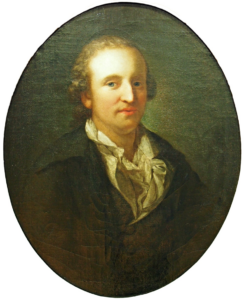Daphne by the brook
(Poet's title: Daphne am Bach)
Set by Schubert:
D 411
[April 1816]
Ich hab ein Bächlein funden
Vom Städtchen ziemlich weit,
Da bin ich manche Stunden
In stiller Einsamkeit.
Ich tät mir gleich erkiesen
Ein Plätzchen kühles Moos,
Da sitz ich, und da fließen
Mir Tränen in den Schoß.
Für dich, für dich nur wallet
Mein jugendliches Blut;
Doch, leise nur erschallet
Dein Nam’ an dieser Flut.
Ich fürchte, dass mich täusche
Ein Lauscher aus der Stadt;
Es schreckt mich das Geräusche
Von jedem Pappelblatt.
Ich wünsche mir zurücke
Den flüchtigsten Genuss;
In jedem Augenblicke
Fühl ich den Abschiedskuss.
Es ward mir wohl und bange,
Als mich dein Arm umschloss,
Als noch auf meine Wange
Dein letztes Tränchen floss.
Von meinem Blumehügel
Sah ich dir lange nach;
Ich wünschte mir die Flügel
Der Täubchen auf dem Dach;
Nun glaub ich zu vergehen
Mit jedem Augenblick.
Willst du dein Liebchen sehen,
So komme bald zurück.
I have found a little brook
Quite a distance away from my small town,
I spend quite a few hours there
In quiet solitude.
I soon set about choosing
A little spot on the cool moss;
I sit there, and that is where
Tears fall down into my lap.
It pulses for you, for you alone,
My youthful blood;
Yet only very faintly can you hear the sound
Of your name carried on this surging water.
I was afraid that I was going to be betrayed
By an eavesdropper from the town;
I get terrified by the rustling
Of each poplar leaf.
I want to go back to when I had
That most fleeting enjoyment;
At every moment
I feel that farewell kiss.
I was both happy and anxious
When your arms embraced me
And when onto my cheeks I felt
Your last little teardrops fall!
From my flower-covered hill
I watched you for a long time;
I wanted to have the wings
Of the doves on the roof;
I now believe that I am about to expire
As each moment passes.
If you want to see your beloved,
Just come back quickly!
All translations into English that appear on this website, unless otherwise stated, are by Malcolm Wren. You are free to use them on condition that you acknowledge Malcolm Wren as the translator and schubertsong.uk as the source. Unless otherwise stated, the comments and essays that appear after the texts and translations are by Malcolm Wren and are © Copyright.
☙
Themes and images in this text:
Arms and embracing Being solitary, alone and lonely Blood By water – river banks Cheeks Doves and pigeons Farewell and leave taking Floods and tides Flowers Hills and mountains Kissing Lap, womb (Schoß) Laurel Leaves and foliage Moss Names Poplars Rivers (Bach) Rivers (Bächlein) Tears and crying Towns Wings
This Daphne does not share all of the attributes of her classical namesake. Although she sits by a river (the Greek nymph was the daughter of a river god) her flight from society has not been the result of being chased by an unwanted admirer (Apollo). In fact, it is because she is so passionately in love that she has sought out this secluded spot. She is afraid not of being caught by her pursuer but of being reported for being seen in a gentleman’s company (she states explicitly that she needs to get away from the ‘small town’ that she is part of, so we can imagine the sort of tut-tutting and stronger disapproval that she wants to avoid). According to Ovid, the classical Daphne escaped her fate by changing into a laurel tree; Stolberg’s Daphne is not going to do that – she is terrified when she hears a poplar leaf rustling in the wind.
We only know for certain that she and her lover met, embraced and kissed once. She admits that the pleasure was ‘fleeting’. We can probably guess why she was ‘anxious’ as well as happy during their time together. Since her tears fall into her lap (‘Schoß’ can also mean ‘womb’, of course) we realise that she is worried about the consequences. Is she now a fallen woman? Will he ever return? She might soon decide that instead of wishing she had wings she wants to turn into a laurel tree after all.
☙
Original Spelling Daphne am Bach Ich hab ein Bächlein funden Vom Städtchen ziemlich weit, Da bin ich manche Stunden In stiller Einsamkeit. Ich thät mir gleich erkiesen Ein Plätzchen kühles Moos; Da sitz' ich, und da fließen Mir Thränen in den Schooß. Für dich, für dich nur wallet Mein jugendliches Blut; Doch, leise nur erschallet Dein Nam' an dieser Flut. Ich fürchte, daß mich täusche Ein Lauscher aus der Stadt; Es schreckt mich das Geräusche Von jedem Pappelblatt. Ich wünsche mir zurücke Den flüchtigsten Genuß; In jedem Augenblicke Fühl ich den Abschiedskuß. Es ward mir wohl und bange, Als mich dein Arm umschloß, Als noch auf meine Wange Dein letztes Thränchen floß! Von meinem Blumehügel Sah ich dir lange nach; Ich wünschte mir die Flügel Der Täubchen auf dem Dach; Nun glaub' ich zu vergehen Mit jedem Augenblick. Willst du dein Liebchen sehen, So komme bald zurück!
Confirmed by Peter Rastl with Gedichte der Brüder Christian und Friedrich Leopold Grafen zu Stolberg. herausgegeben von Heinrich Christian Boie. Leipzig, in der Weygandschen Buchhandlung. 1779, pages 97-98; and with Poetische Blumenlese Für das Jahr 1776. Von den Verfassern der bisherigen Göttinger Blumenlese […] Herausgegeben von J. H. Voß. Lauenburg, gedruckt bey Johann Georg Berenberg, pages 105-106.
To see an early edition of the text, go to page 64 [78 von 238] here: http://digital.onb.ac.at/OnbViewer/viewer.faces?doc=ABO_%2BZ160626609


